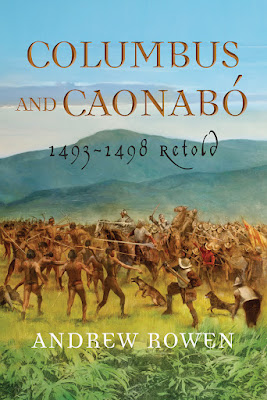Congrats Andrew
on the recent release of
Columbus and Caonabó!
Columbus and Caonabó: 1493–1498 Retold
Andrew Rowen | November 9, 2021
All Persons Press | Historical Fiction |
Hardcover | 978-0-9991961-3-7 | $32.95
Ebook | 978-0-9991961-4-4 | $12.99
Paperback | 978-0-9991961-5-1 | $19.95 (releasing in 2022)
Author Andrew Rowen retells the history of Columbus’s invasion of Española on his second voyage from a bicultural perspective in the historical fiction novel Columbus and Caonabó: 1493–1498 Retold, releasing on Nov. 9, 2021—the sequel to his lauded 2017 bicultural presentation of Columbus’s first voyage, Encounters Unforeseen: 1492 Retold.
Columbus assured Spain’s Queen Isabella and King Ferdinand that he’d conquer “Española” with little opposition from its inhabitants, but he soon discovered the promise ominously false. A historical novel, Columbus and Caonabó: 1493–1498 Retold dramatizes his invasion of the island on his second voyage and the bitter resistance mounted by its Taíno peoples, led by the Taíno chieftain Caonabó. Based closely on primary sources, the story is told from both Taíno and European perspectives, including through the eyes of Caonabó and Columbus.
Chief Caonabó opposes any European presence on the island and massacres the garrison Columbus left behind on his first voyage. When Columbus returns, the second voyage’s twelve-hundred settlers suffer from disease and famine and are alienated by his harsh rule, resulting in crown-appointed officers and others deserting for Spain. Sensing European vulnerability, Caonabó establishes a broad Taíno alliance to expel the intruders, becoming the first of four centuries of Native American chieftains known to organize war against European expansion. Columbus realizes that Caonabó’s capture or elimination is key to Española’s conquest, and their conflict escalates—with the fateful clash of their soldiers, cultures, and religions, enslavement of Taíno captives, the imposition of tribute, and hostile face-to-face conversations.
As battles are lost, Caonabó’s wife Anacaona anguishes and considers how to confront the Europeans if Caonabó is killed. The settlers grow more brutal when Columbus explores Cuba and Jamaica, and his enslaved Taíno interpreters witness them forcing villagers into servitude, committing rape, and destroying Taíno religious objects. Chief Guarionex, whose territory neighbors Caonabó’s, studies Christianity with missionaries and observes the first recorded baptism of a Native in the Americas but ultimately rejects his own conversion. All brood upon the spirits’ or Lord’s design as epidemic diseases ravage the island’s peoples. Isabella and Ferdinand are disturbed when Columbus initiates slave shipments home, but they deliberately acquiesce—and the justification for the European enslavement of Native Americans begins to evolve.
The novel is the sequel to Encounters Unforeseen: 1492 Retold, which portrays the lives of the same Taíno and European protagonists from youth through 1492.
There are forty-two historic or newly drawn maps and illustrations woven into the narrative, including portraits or sketches of Columbus, Caonabó, Isabella, and Anacaona. A Sources section cites authorities and discusses interpretations of historians and anthropologists contrary to the author’s presentation and issues of academic disagreement.
***********************
Excerpt
Alone, Anacaona relished the solitude and serenity of her garden. But the question that had scorched her thoughts for weeks returned to engulf her, as its answer burned due—how should she rule if Caonabó perished? She begged Yúcahu’s guidance and ambled aimlessly about the garden, mesmerized by the beauty of Haiti’s blossoming trees, shrubs, and cacti, which glowed radiant in the sunlight, and desperate for their wisdom.
Anacaona minced beneath the shade of the magnolia trees, both sturdy and pretty, which reminded her of the wives just departed—straightforward, loyal, and dependable. They were the backbone of the garden, and the broad tapestry of their white petals and reddish fruits spoke of the ascendance of beauty and goodness over grotesqueness and evil. She was taken by the size and strength of the supporting limbs. But Yúcahu warned that a woman didn’t rule by those qualities.
She came to the garden’s pond abutting the riverbank, gazing sadly upon the lilies floating within. Their pink-and-white flowers shone with beauty, as the magnolias, but they lay apart, out of reach but for wading. Anacaona was taken by their separation and isolation. But Yúcahu observed that isolation alone was a fragile solution, as the pale men weren’t shy to trespass, even across an ocean.
She strolled among the orchids, patient for revelation. They were far more alluring than the magnolias and lilies, yet far more delicate, bewitching greater desire and adoration, but, as young girls, easily destroyed in conflict. Her own beauty rivaled them. Prior to marriage, she’d well known how to bring men to pant before her, and she was taken by the orchids’ power to smite. But Yúcahu warned that the power to smite wasn’t enough without the power to destroy.
Tiring, Anacaona sat among the cacti, which were resolute, forbidding, and vicious, ascendant when the sun was most brutal, warning aggressors away, and piercing them if they trespassed too close. Without forethought, her eyes passed over the pretty pink blossoms cloaking the delicate limbs of a Bayahibe bush, which emanated gracefully from an inner torso, largely shrouded unseen behind the many blossoms. It had been a wedding gift from Higüey’s Cayacoa, her husband’s friend, and its trunk was as cactus, covered with needles.
Roused, Anacaona fell to her knees upon her nagua to peek beneath the branches to the bristling trunk, sensing Yúcahu’s design to have brought her before it. The bush was both alluring and vicious, perhaps not as enticing as the orchid or even the lily, or as sturdy as the magnolia or other cactuses, but neither delicate nor destructible. She grasped that it was sublimely endowed to draw the unsuspecting close and then stab. Yúcahu intimated that it flourished as a beautiful woman might rule, alluring enemy to friendship, warming if friendship were reciprocated, piercing if not, and never truly befriending, with barbs ever vigilant and poised to preserve her people’s civilization.
***********************
About the author
Andrew Rowen has devoted ten years to researching the history leading to the first encounters between Europeans and the Caribbean’s Taíno peoples, including visiting sites where Columbus and Taíno chieftains lived, met, and fought.
His first novel, Encounters Unforeseen: 1492 Retold (released 2017), portrays the life stories of the chieftains and Columbus from youth through their encounters in 1492. His second, Columbus and Caonabó: 1493–1498 Retold (to be released November 9, 2021), depicts the same protagonists’ bitter conflict during the period of Columbus’s second voyage.
Andrew is a graduate of U.C. Berkeley and Harvard Law School and has long been interested in the roots of religious intolerance.
Connect with Andrew
**********************
Be sure to check the sidebar for all of my current giveaways!




Thank you for sharing this nice post. I really loved reading this. Keep up the good work.
ReplyDeleteKeySmart Reviews 2021: Best Key Organizer For Anyone
Impressive! Thank You For The Post.
ReplyDeleteSection 80C Deduction on Investments!